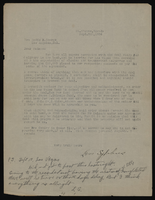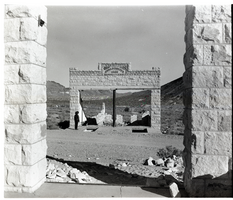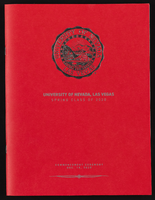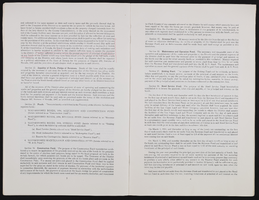Search the Special Collections and Archives Portal
Search Results
Las Vegas News Bureau Photograph Collection
Identifier
Abstract
The Las Vegas News Bureau Photograph Collection consists of black-and-white and color photographic prints, negatives, and slides depicting Las Vegas, Nevada from approximately 1940 to 1989. The images primarily depict hotels on the Strip in Las Vegas, Nevada, including Caesars Palace Las Vegas Hotel and Casino, the Flamingo Hotel & Casino, and the Desert Inn Hotel and Casino. Also included are images of the convention center in Las Vegas and Cashman Field, as well images of entertainers performing on the Las Vegas Strip. The collection consists entirely of photographic reproductions.
Archival Collection
Morrison Family Photograph Collection
Identifier
Abstract
The Morrison Family Photograph Collection (1917-1933) consists of black-and-white and color photographic prints, negatives, and slides. The images primarily depict the Morrison family in Las Vegas, Nevada and the surrounding areas. Images portray youth activities in Nevada, including a local Boy Scouts Troop, Las Vegas High School students, Clark County High School students, as well as student activities at the University of Nevada, Reno. Also included are images of scenes around Las Vegas, including Mount Charleston, Little Falls, and the Colorado River prior to the Hoover Dam (Boulder Dam). Other images include Morrison family trips to California, Utah, Oregon, and Arizona.
Archival Collection
Hank Harrison Photograph Collection on Helldorado Days
Identifier
Abstract
The Hank Harrison Photograph Collection on Helldorado Days contains two black-and-white photographs of the Helldorado Days festival in Las Vegas, Nevada from approximately 1940 to 1977. The first photograph depicts a rodeo clown distracting a bull; the second photograph is of Ned Romero, an actor in Helldorado.
Archival Collection
UNLV Libraries Collection of 1983 Hoover Dam Overflow Photographs
Identifier
Abstract
The UNLV Libraries Collection of 1983 Hoover Dam Overflow Photographs is a series of color photographs that document the historic water overflow at Hoover Dam as seen from the Arizona side of the dam. Taken in August of 1983, this overflow marked the first time the spillways were used during a flood. The spillways were previously tested once in 1941 after the dam was initially filled.
Archival Collection
Charles Rozaire Collection on Tule Springs, Nevada
Identifier
Abstract
The Charles Rozaire Collection on Tule Springs, Nevada (1950-2005) contains photographic slides of various archeological sites across Clark County, Nevada, the majority of which were taken at the Tule Springs archaeological site. The collection also contains Rozaire's files documenting the excavation investigations at Tule Springs which include Rozaire's writings, newspaper clippings, programs, and photocopied articles regarding Tule Springs.
Archival Collection

Correspondence, Levi Syphus to Sadie George
Date
Archival Collection
Description
Text

Meeting minutes for Consolidated Student Senate, University of Nevada, Las Vegas, March 10, 1981
Date
Archival Collection
Description
Text

Film transparency of the ruins of the H. D. and L. D. Porter Brothers Store, Rhyolite, Nevada, November 25, 1948
Date
Archival Collection
Description
Image

University of Nevada, Las Vegas (UNLV) Spring 2020 commencement program
Date
Archival Collection
Description
Commencement program from University of Nevada, Las Vegas Commencement Programs and Graduation Lists (UA-00115).
Text

